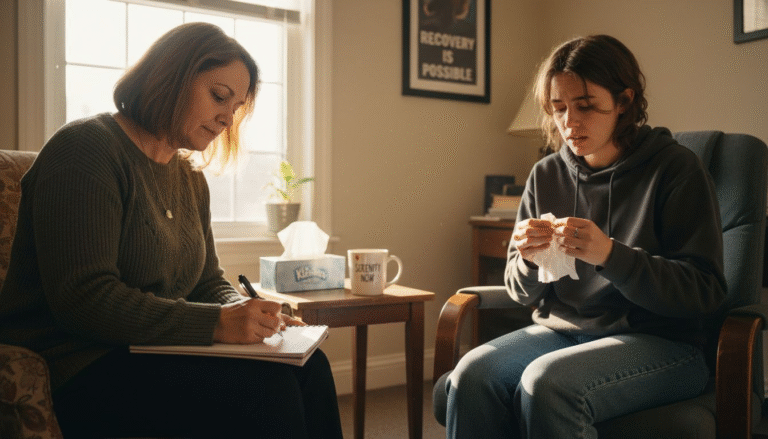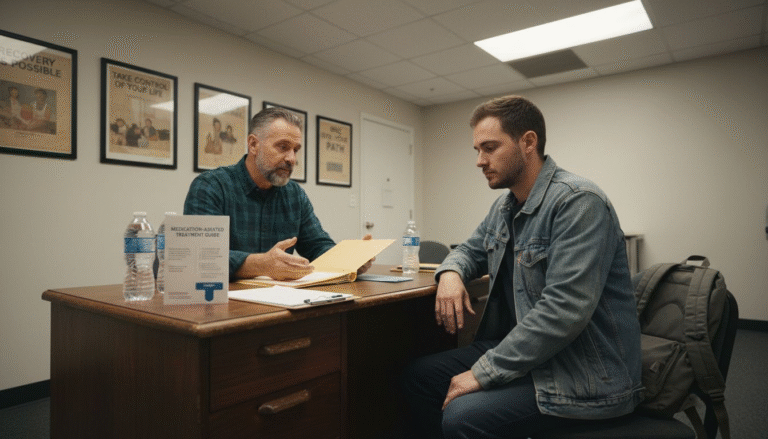More than 75 percent of people seeking addiction or mental health support need flexible solutions that fit real life. Outpatient treatment programs offer structured care without taking you away from work, school, or family. This approach makes recovery more manageable and keeps daily routines intact, allowing you to get help while staying connected to your community. Discover how outpatient services deliver support, flexibility, and practical tools that make lasting change possible.
Table of Contents
- Defining Outpatient Treatment Programs
- Types of Outpatient Addiction Services
- How Outpatient Treatment Supports Recovery
- Key Benefits Over Inpatient Rehab
- Common Barriers and Success Factors
Key Takeaways
| Point | Details |
|---|---|
| Flexible Structure | Outpatient treatment programs allow individuals to receive care while managing daily responsibilities, offering a less disruptive alternative to inpatient rehab. |
| Variety of Services | Different programs (OP, IOP, PHP) cater to varying levels of need, ensuring personalized treatment options for each individual’s recovery journey. |
| Cost-Effectiveness | Outpatient programs are generally more affordable than inpatient services, enabling participants to maintain their work and family commitments. |
| Success Factors | Motivation and strong support systems are crucial for successful recovery in outpatient settings, where personal resolve drives positive outcomes. |
Defining Outpatient Treatment Programs
Outpatient treatment programs are structured therapeutic interventions designed to support individuals struggling with addiction or mental health challenges while allowing them to maintain their daily life responsibilities. According to National Association of Addiction Treatment Providers, outpatient services encompass various levels of care, ranging from general outpatient programming to more intensive treatment models.
Outpatient treatment provides a flexible approach to recovery that differs significantly from residential or inpatient programs. Participants attend scheduled therapy sessions, counseling, and treatment activities while continuing to live at home and potentially maintaining work or educational commitments. These programs are particularly beneficial for individuals with mild to moderate substance use disorders who have strong support systems and do not require round-the-clock medical supervision.
Typically, outpatient treatment programs include several key components:
- Individual counseling sessions
- Group therapy meetings
- Mental health assessments
- Relapse prevention planning
- Family therapy options
- Skill-building workshops
The flexibility of outpatient treatment allows participants to integrate therapeutic interventions into their existing lifestyle, making recovery more accessible and sustainable.

Types of Outpatient Addiction Services
Outpatient addiction services offer a spectrum of treatment options designed to accommodate varying levels of individual recovery needs. According to Cedar Colorado, there are three primary types of outpatient programs: regular outpatient programs (OP), intensive outpatient programs (IOP), and partial hospitalization programs (PHP), each distinguished by different time commitments and intensity levels.
Regular Outpatient Programs (OP) represent the most flexible treatment model, typically involving minimal weekly therapy sessions. These programs are ideal for individuals with mild substance use disorders who require minimal clinical intervention. Participants usually attend counseling or group therapy once or twice weekly, allowing maximum integration with personal and professional responsibilities.
By contrast, Intensive Outpatient Programs (IOP) provide a more structured approach. These programs demand greater time investment, often requiring 9-12 hours of treatment per week. IOPs are particularly effective for individuals transitioning from inpatient treatment or those needing more comprehensive support than traditional outpatient services. As Office of Addiction Services notes, these programs are designed to meet diverse patient needs while maintaining personal autonomy.
Key variations in outpatient addiction services include:
- Regular outpatient counseling (minimal time commitment)
- Intensive outpatient treatment (higher treatment frequency)
- Partial hospitalization programs (most structured daytime treatment)
- Evening and weekend program options
- Individual and group therapy configurations
For individuals seeking a tailored recovery experience, why choose outpatient rehab depends on personal circumstances, severity of addiction, and individual treatment goals. Each program type offers unique benefits, ensuring that comprehensive addiction support remains accessible and adaptable to diverse personal needs.
How Outpatient Treatment Supports Recovery
Outpatient treatment offers a comprehensive approach to recovery that empowers individuals to heal while maintaining their daily life responsibilities. According to National Center for Biotechnology Information, these programs support recovery by providing structured therapy sessions that allow patients to apply learned skills directly in their personal environments, creating a seamless integration of therapeutic strategies into real-world contexts.
Skill development stands at the core of outpatient treatment’s recovery support. Participants engage in individual and group counseling that teaches critical coping mechanisms, emotional regulation techniques, and relapse prevention strategies. Addiction Group emphasizes that these programs provide crucial support systems helping individuals adjust to life with their loved ones while maintaining sobriety and managing potential challenges.
Key recovery support mechanisms in outpatient treatment include:
- Continuous therapeutic engagement
- Flexible scheduling accommodating personal responsibilities
- Development of robust coping strategies
- Building supportive peer and professional networks
- Real-time application of recovery skills
- Personalized treatment planning
The unique strength of outpatient treatment lies in its ability to create a bridge between clinical intervention and everyday life. 7 key advantages of outpatient programs demonstrate how these services provide comprehensive support while allowing individuals to maintain their personal and professional commitments, ultimately fostering sustainable, long-term recovery.
Key Benefits Over Inpatient Rehab
Outpatient treatment offers significant advantages that distinguish it from traditional inpatient rehabilitation programs. According to the National Association of Addiction Treatment Providers, these programs enable patients to live at home, facilitating seamless integration of treatment into daily life while maintaining access to critical community support systems.
Cost-effectiveness emerges as a primary benefit of outpatient treatment. Unlike inpatient rehab, which requires extensive residential facilities and round-the-clock staffing, outpatient programs dramatically reduce overall treatment expenses. Patients can continue working, maintaining family responsibilities, and participating in their regular life routines while receiving comprehensive therapeutic support.
Key advantages of outpatient treatment over inpatient rehab include:
- Maintaining personal and professional commitments
- Lower financial investment
- Immediate real-world skill application
- Continued family and social support
- Flexible treatment scheduling
- Reduced disruption to daily life
Through exploring partial hospitalization programs, individuals can discover a more personalized, adaptive approach to recovery that respects their individual circumstances while providing robust, comprehensive therapeutic interventions. The goal is not isolation, but empowerment and sustainable healing within one’s existing support network.
Common Barriers and Success Factors
Navigating outpatient treatment requires understanding both the potential challenges and critical success factors. According to the National Center for Biotechnology Information, individuals often encounter significant barriers such as limited transportation, childcare constraints, and insufficient support systems that can impede their recovery journey.
Motivation stands as the most crucial success factor in outpatient treatment. While external resources are important, an individual’s internal commitment to recovery determines the ultimate outcome. Participants who demonstrate strong personal resolve, coupled with a supportive home environment, are significantly more likely to achieve sustainable recovery. This internal drive must be complemented by comprehensive services that address multiple dimensions of an individual’s life and challenges.
Key barriers to successful outpatient treatment include:
- Limited transportation options
- Inadequate childcare support
- Unstable home environments
- Financial constraints
- Work schedule conflicts
- Insufficient personal support networks
To overcome these challenges, outpatient mental health services often provide flexible scheduling, telehealth options, and comprehensive support mechanisms. The goal is creating an adaptive treatment approach that recognizes individual circumstances while maintaining a clear path to recovery, transforming potential obstacles into opportunities for personal growth and healing.
Discover Personalized Outpatient Recovery at Glendora Recovery Center
If you are looking for flexible and effective outpatient treatment that fits your unique recovery needs outpatient programs provide the perfect balance between therapeutic support and maintaining your daily responsibilities. Many face challenges like managing work schedules transportation issues and building lasting coping skills. Our Partial Hospitalization Programs and Intensive Outpatient Programs are designed with these specific barriers in mind offering flexible scheduling including morning evening weekend and telehealth options. This means you get the care you need without sacrificing family time or professional commitments.
Take control of your recovery journey today by accessing compassionate individualized care at Glendora Recovery Center. We specialize in supporting adults and teens dealing with substance abuse and co-occurring disorders using a harm-reduction approach along with family therapy and aftercare support. Don’t wait until barriers hold you back. Visit our contact page to learn how we tailor outpatient services for your success and explore why choosing outpatient rehab could be the right step for lasting change. Reach out now and start building a stronger future with support that fits your life.
Frequently Asked Questions
What are outpatient treatment programs?
Outpatient treatment programs are structured therapeutic interventions that support individuals with addiction or mental health challenges while they continue to manage daily responsibilities, such as work or education.
What types of outpatient addiction services are available?
There are three primary types of outpatient addiction services: regular outpatient programs (OP), intensive outpatient programs (IOP), and partial hospitalization programs (PHP). Each varies in intensity and time commitment to cater to different recovery needs.
What are the key benefits of outpatient treatment compared to inpatient rehab?
Outpatient treatment offers numerous advantages, including lower costs, the ability to maintain daily commitments, immediate real-world application of skills, and continued access to family and community support, promoting sustainable recovery.
What challenges do individuals face in outpatient treatment?
Common barriers to successful outpatient treatment include limited transportation, inadequate childcare support, unstable home environments, financial constraints, work schedule conflicts, and insufficient personal support networks.




